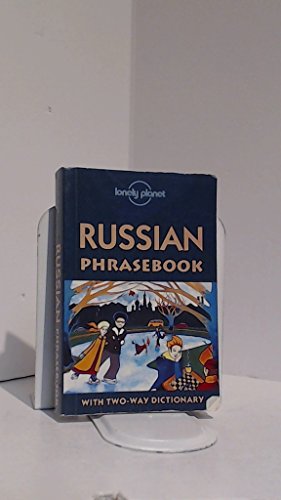Lonely Planet Russian Phrasebook : With Two-Way Dictionary (Lonely Planet Russian Phrasebook) - Softcover

You're in Russia. Chances are you'll have to stand in line at least once. With this book in hand, this potentially dreary experience could become a social event. Talk politics, meet the love of your life or simply ask where the toilets are. It's really up to you but if you don't try, you'll never know what's possible. Take control of your travels and open your mouth. You know you want to.
- greetings and etiquette explained
- clear and concise grammar section
- pronunciations supplied throughout
- cultural tips that will help you see Russia from the 'inside'
- eat and drink Russia
- discover the truth about pickled watermelon
- extensive two-way dictionary
"synopsis" may belong to another edition of this title.
At Lonely Planet, we see our job as inspiring and enabling travellers to connect with the world for their own benefit and for the benefit of the world at large.
What We Do
* We offer travellers the world's richest travel advice, informed by the collective wisdom of over 350 Lonely Planet authors living in 37 countries and fluent in 70 languages.
* We are relentless in finding the special, the unique and the different for travellers wherever they are.
* When we update our guidebooks, we check every listing, in person, every time.
* We always offer the trusted filter for those who are curious, open minded and independent.
* We challenge our growing community of travellers; leading debate and discussion about travel and the world.
* We tell it like it is without fear or favor in service of the travellers; not clouded by any other motive.
What We Believe
We believe that travel leads to a deeper cultural understanding and compassion and therefore a better world.
Despite the distribution of Russian speakers, the standard variety used in this book is universally understood. Russian has slight regional differences, but these are not generally termed 'dialects' - the pronunciation of individual sounds or vocabulary differs only slightly, similar to variations in English across the USA. One reason for this uniformity is that 'standard' Russian is strictly enforced by the Russian education system - deviations from this standard are stigmatized, implying a lack of education and culture.
Russian uses the Cyrillic alphabet, which is based on Greek. St Cyril and St Methodius, Greek missionaries in the ninth century, translated the Bible into the language now known as Old Church Slavonic, using a modified alphabet to represent non-Greek sounds. This early script developed into the alphabets used in many modern Slavic languages, including Russian. Before the dissolution of the USSR in 1991, the influence and power of Russian language and culture was widespread all over the former Soviet Union, and Russian Cyrillic was introduced to transcribe various non-Slavic and even non-Indo-European languages such as Mongolian and Kurdish.
You don't need to learn the Cyrillic alphabet to use this book, but it's not difficult, and it's very useful (especially for reading placenames). Some letters even look and sound the same as English (A, E, K, M, O, T). Also, most letters only have one or two possible pronunciations, which you can predict from context. The one trap is that some letters look like English but sound totally different - the letter H sounds like 'N', and P sounds like 'R'!
Russian is very closely related to Belarusian and Ukrainian (all being East Slavic lanuages) - and politics aside, a Russian and a Ukrainian can communicate quite well, each using their own language. In fact all the Slavic languages have more in common than, for example, the Germanic languages, and so Russian makes a convenient springboard for learning Czech or Polish.
As there's been limited contact between Russia and the west, and it's hard to find English speakers outside the major centers, your effort to speak the local language will often be greeted with surprise and interest. Fsevo kharosheva!
"About this title" may belong to another edition of this title.
- PublisherLonely Planet Publications
- Publication date2000
- ISBN 10 1864501065
- ISBN 13 9781864501063
- BindingPaperback
- Edition number3
- Number of pages320
- Rating
Buy New
Learn more about this copy
Shipping:
US$ 4.13
Within U.S.A.
Top Search Results from the AbeBooks Marketplace
LONELY PLANET RUSSIAN PHRASEBOOK
Book Description Condition: New. New. In shrink wrap. Looks like an interesting title! 0.35. Seller Inventory # Q-1864501065

